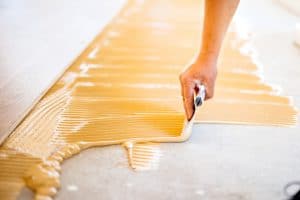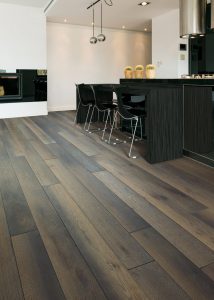A well-maintained hardwood floor offers a timeless beauty to a home that is hard to replicate with other products, whether natural stones and ceramics or manufactured laminates or luxury vinyl planks. In fact, wooden floors were a standard in homes for years. However, while they can be gorgeous, they do have some downsides. When considering whether hardwood flooring is the right choice for your project, it is important to look at the pros and cons of hardwood flooring.
Pros
Timeless. Not only have hardwoods remained in-style for centuries, but a well-maintained wood floor can actually last that long, as well.
Increase the resale value of your home. When you are buying or selling a home, flooring is expected. Worn or damaged flooring can decrease your resale value, but even new installs of most other flooring materials do not increase your resale value above comparables in your area, but hardwood floors can.
Natural beauty. Hardwood floors offer variety, with every plank showing natural variation, which simply cannot be replicated in even the highest-quality synthetics.
Easy to clean. Hardwood floors can generally be maintained by vacuuming, dry-mopping, and mopping. With the right sealants, they can be water-resistant enough to use cleaners that are safe for wood-floors, which also tend to make them stain-resistant.
Change the look of the floor without replacing it. By refinishing and re-staining a wood floor, you can change the entire appearance of the floor without the expense of a replacement.
Great acoustics. Wood flooring is great for acoustics, which can be great if you are a music lover. It prevents the types of vibrations you can get from other types of flooring or the dampening you get from a carpeted surface.
Environmentally friendly. Wood flooring is the original organic flooring option and many of today’s modern hardwood flooring options are harvested in an environmentally sustainable way that actually promotes good forestry practices.
Cons
Weather responsive. Hardwood floors expand and contract with changes in temperature and humidity, which can lead to swelling and make them a poor choice in some environments.
Expensive. Even affordable wood flooring is usually more expensive than most other flooring options. While they do not need to be replaced as often as other types of flooring, this upfront expense can be daunting.
Vulnerable to water damage. One of the biggest drawbacks of a hardwood floor is that it is vulnerable to water damage. A leaky toilet, dishwasher, washing machine, or water heater can lead to significant damage to your hardwood floors, though staining and sealing may make them safe for the moisture exposure that comes with everyday use.
Vulnerable to other damage. Wood floors are not as resilient as other types of floors and may get dented, scratched, or stained. However, because they can be refinished if they are damaged, unlike many other types of floors, this vulnerability does not necessarily mean a ruined floor.


